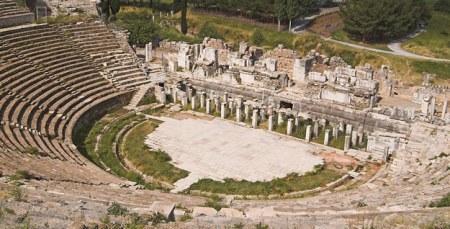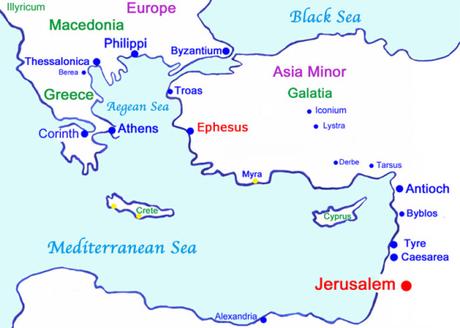Grace Thoughts
Teaching Ephesians – The Gospel of Your Salvation (Part 1)

Courtesy of D. Osseman library
We are sharing a special series about teaching the Book of Ephesians in small groups. If you haven’t read the Introduction to this series, we invite you to read it here.
My first experience with teaching Ephesians was about 45 years ago. One reason I taught it to churches and small groups was because of the richness of Ephesians in my own life. It literally guided my life and ministry in new directions.
I had the opportunity to teach small group leaders how to teach the Book of Ephesians and this series came from that experience.
Whether you are interested in studying Ephesians for the purpose of teaching it to small groups or for your own personal study, we believe you will find this series helpful.
Paul the Apostle
Paul was a Jew, born in Tarsus of Cilicia, which is now part of Turkey. His Hebrew name was Saul, but because he was a Roman citizen he was also known as Paul (Latin transliteration of the name ‘Saul’). We see his name change from Saul to Paul in Acts 13. The Holy Spirit spoke to the prophets and teachers at the Antioch church and said, “Now separate to Me Barnabas and Saul for the work to which I have called them.” (vs 2) It was after Barnabas and Saul obeyed the Holy Spirit and began their first missionary journey to preach the Gospel to the Roman world that we see Saul called Paul – “Then Saul, who also is called Paul, filled with the Holy Spirit, looked intently at him …” (vs. 9) Paul is referred to as ‘Paul’ from that point on in Acts, except for when he shared his testimony about Jesus speaking to him on the road to Damascus (Acts 22:7).
Paul’s father was a Pharisee from the tribe of Benjamin and Paul was also a Pharisee. He studied at the prestigious School of Hillel in Jerusalem at the feet of Gamaliel, the grandson of the founder of the rabbinical school. Paul was taught according to the strictness of the Mosaic Law and was zealous toward God. He persecuted followers of Christ to the death, binding and delivering into prisons both men and women.
Paul was on his way to Damascus to arrest disciples of Christ there to return them to Jerusalem to be punished, when Christ blinded Paul and spoke to him. Jesus called Paul to preach the Gospel to Gentiles, kings and Jews. Paul believed, was baptized, began preaching, and became an apostle to the Gentiles (Romans 11:13).
We learn in Acts 9 that Jesus sent Ananias to lay his hands on Paul (Saul) so that he would receive his sight and “be filled with the Holy Spirit.” Paul spent several days with the disciples at Damascus, then preached in synagogues that Jesus Christ was the Son of God. (Acts 9:17-20)
Here is Paul’s account of Christ’s call in his own words to King Agrippa.
“While thus occupied, as I journeyed to Damascus with authority and commission from the chief priests, at midday, O king, along the road I saw a light from heaven, brighter than the sun, shining around me and those who journeyed with me. And when we all had fallen to the ground, I heard a voice speaking to me and saying in the Hebrew language, ‘Saul, Saul, why are you persecuting Me? It is hard for you to kick against the goads.’ So I said, ‘Who are You, Lord?’ And He said, ‘I am Jesus, whom you are persecuting. But rise and stand on your feet; for I have appeared to you for this purpose, to make you a minister and a witness both of the things which you have seen and of the things which I will yet reveal to you. I will deliver you from the Jewish people, as well as from the Gentiles, to whom I now send you, to open their eyes, in order to turn them from darkness to light, and from the power of Satan to God, that they may receive forgiveness of sins and an inheritance among those who are sanctified by faith in Me.” Acts 26:12-18
Paul returned to Tarsus for his own safety and was there for several years. What he did while home in Tarsus is not recorded for us in Acts or Paul’s letters, but it was probably a time of study and reflection for the apostle along with preaching the Gospel in Tarsus and surrounding towns in the region of Cilicia (Galatians 1:21). Based on the time frame Paul revealed in his second letter to the Corinthians, it would have also been when he received visions of Paradise and special knowledge God wanted him to know for his ministry to the Gentiles (2 Corinthians 12:1-7).
We know that when the apostles in Jerusalem sent Barnabas to Antioch, Syria to see what God was doing there, Barnabas traveled north to Tarsus to get Paul and return with him to Antioch. They spent a year teaching the believers there and the disciples were first called “Christians in Antioch.” (Acts 11:25-26)
Based on a prophecy from Agabus, “that there was going to be a great famine throughout all the world,” Barnabas and Saul (Paul) took an offering to the disciples in Jerusalem to help meet their needs. (Acts 11:27-30) Barnabas and Saul returned from Jerusalem to Antioch and took John Mark with them. (Acts 12:25)
Paul and Barnabas continued their teaching ministry in Antioch until the Holy Spirit led the prophets and teachers of the church to “separate to Me Barnabas and Saul for the work to which I have called them.” The prophets and teachers fasted and prayed, laid hands on Barnabas and Saul and sent them away. (Acts 13:1-3) That was the beginning of what we know as Paul’s first missionary journey.
Paul shared more specifics about the history of his ministry to Gentiles in his letter to the churches in Galatia.
“But when it pleased God, who separated me from my mother’s womb and called me through His grace, to reveal His Son in me, that I might preach Him among the Gentiles, I did not immediately confer with flesh and blood, nor did I go up to Jerusalem to those who were apostles before me; but I went to Arabia, and returned again to Damascus. Then after three years I went up to Jerusalem to see Peter, and remained with him fifteen days. But I saw none of the other apostles except James, the Lord’s brother. (Now concerning the things which I write to you, indeed, before God, I do not lie.) Afterward I went into the regions of Syria and Cilicia. And I was unknown by face to the churches of Judea which were in Christ. But they were hearing only, He who formerly persecuted us now preaches the faith which he once tried to destroy.’ And they glorified God in me. Then after fourteen years I went up again to Jerusalem with Barnabas, and also took Titus with me. And I went up by revelation, and communicated to them that gospel which I preach among the Gentiles, but privately to those who were of reputation, lest by any means I might run, or had run, in vain.” Galatians 1:17 – 2:2
Paul and the Churches
 Courtesy BibleScripture.net
Courtesy BibleScripture.net
Paul established churches in many cities across the Roman Empire. One of those cities was Ephesus, located in Asia Minor near the Mediterranean Sea. Paul wrote letters to many of the churches to help them grow in Christ and deal with problems and challenges. Ephesians is one of those letters.
The most likely place for Paul to have written Ephesians is during the two years he spent in Rome under house arrest (Acts 28), though some scholars believe he may have written Ephesians during his earlier imprisonment in Caesarea (Acts 23–26).
Paul wrote several letters during his imprisonment: Ephesians, Colossians, Philemon and Philippians. They are known as Paul’s ‘Prison Epistles’. If he wrote them from Rome, the dating would be during the early part of the 7th decade of the 1st century AD (60-62 AD). If Paul wrote them from Caeserea, the dating would be during the last part of the 6th decade of the 1st century AD (57-59 AD).
The words “in Ephesus” in 1:1 are in some ancient manuscripts, but not in others. Ephesians also does not include personal references, which is unusual given Paul’s close relationship with the believers at Ephesus (Acts 19-20). This has led some New Testament scholars to consider that Paul’s letter to the Ephesians may have been a general letter meant to be read by all of the Gentile churches. The manuscripts with the words “in Ephesus” may be there because leaders in the Ephesian church added the words for when it was read to the saints at Ephesus. Other churches receiving the same letter may have done something similar.
Paul was an apostle of Jesus Christ “by the will of God.” He responded positively to God’s call and spent the rest of his life preaching the Gospel of Salvation to Gentiles and Jews.
Basic Premises for Studying Scripture
- God is worth knowing
- His Word is worth learning and obeying
- Because God is worth knowing and His Word is worth learning, we will follow a proven method of knowing Him and learning His Word.
- We will use the I – M – D – I method of Bible study:
- Inductive – Methodical – Direct – Independent
- Inductive study – “logical, objective, impartial reasoning” … examining specifics of Scripture before reaching conclusions
- Methodical study – “a way or path of transit” (Greek – methodos) … focused on taking the proper path to gaining knowledge about God
- Direct study – “relying on Scripture as the primary tool for learning”
- Independent study – “original thinking combined with Spirit insight”
- Observe (See and Record)
- Question (Ask and Answer)
- Interpret (Determine the Holy Spirit’s Intent)
- Apply (How God’s Truth applies to your life)
Bible Study – The Group Process
You may want to begin your small group study of the Book of Ephesians by modeling the process of observing, asking questions for interpretation, interpreting for meaning, and applying for discipleship. This process may be new to some of the people in your group, so going through it with them for awhile may help them feel comfortable with how to do it.
One of the biggest mistakes people make in reading the Bible is trying to interpret the meaning of individual verses before observing everything in the verses. Studying in context also helps keep us from making incorrect interpretations. That means starting the observation process at the beginning of each Bible book.
The challenge in studying alone or with the group is trying to determine the meaning of passages in the Bible before assuring that we’ve observed everything in the passages and asked every possible question. We carefully answer all of the questions before reaching a conclusion to the meaning.
Read the Scripture and go through each step with your group. You may be able to cover observation,questions, interpretation and application in one meeting, but don’t rush the process. It takes time to see everything in a text, ask good questions, get good answers to those good questions, interpret the meaning of the text and apply the meaning to life. If it takes two or three meetings to do that for each text, that’s fine! The goal is to rightly divide God’s Word, not finish by a certain date.
Are you ready? Let’s begin!
[You may want to print this guide for each member of your group.]
Observe – Write what you see
“Paul, an apostle of Jesus Christ by the will of God, To the saints who are in Ephesus, and faithful in Christ Jesus: Grace to you and peace from God our Father and the Lord Jesus Christ.” Ephesians 1:1-2
1.
2.
3.
4.
5.
6.
7.
8.
9.
10.
11.
12.
13.
14.
15.
16.
Question – Ask and answer questions based on observations
1.
2.
3.
4.
5.
6.
7.
8.
9.
10.
11.
12.
13.
14.
15.
16.
17.
18.
19.
Interpret – What is the Holy Spirit’s intent in these verses?
:
:
:
:
:
:
Apply – How can you apply these spiritual truths to your life?
:
:
:
:
:
Next Time
We will look at Ephesians 1:3-6 in the next part of our series, Teaching Ephesians.
Scripture taken from the New King James Version®. Copyright © 1982 by Thomas Nelson. Used by permission. All rights reserved.


Published by gracelifethoughts
Founder & Director of GraceLife Ministries View all posts by gracelifethoughts
